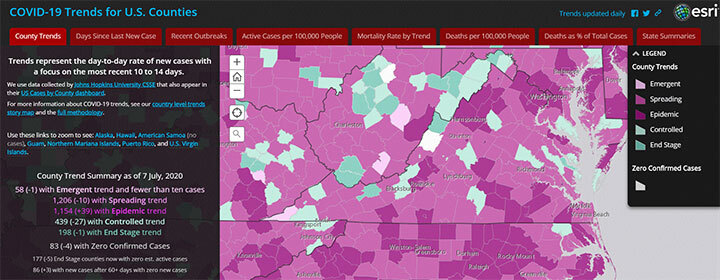How do scientists and public health officials use maps to show and analyze the spread of infectious diseases? What techniques do researchers use to assess trends and predict hotspots? And how is your locality doing in flattening the curve?
Answers to all these questions and more will be offered in a free, online workshop at the University of Lynchburg from 7 to 8 p.m. on Thursday, July 23: “Mapping a Pandemic: Using Geospatial Technologies to Track and Understand the Spread of COVID-19.”

“We’ll overview common geospatial tools such as digital maps and GPS to learn the role they play in our understanding of pandemics,” Dr. David Perault, professor of environmental sciences and sustainability, who will lead the workshop, said. “Using COVID-19 as a case study, we’ll then study the origin and spread of the coronavirus, and show how invaluable such tools are in protecting human health.”
Perault developed the activity as a lab for his Intro to Environmental Science class when Lynchburg moved classes online in March. He has since expanded it for his graduate Applied Geography class and as an exercise for Environmental Health, a Master of Public Health class.
No experience is necessary to participate in the free workshop, but slots are limited. To register, email Perault at perault@lynchburg.edu. A Google Meet link will be sent out upon registration.
Perault’s workshop isn’t the first COVID-19-related course at Lynchburg. This summer, the University is also offering INTL 398: Navigating the Threat of Pandemics. Now in its third session, INTL 398 is taught online by Dr. David Richards, chair of international relations and political science. It examines the national and global response to recent epidemics, such as Ebola, SARS, and H1N1. At the end of the course, students look at how the U.S. government has addressed COVID-19.
Guest speakers have included University of Lynchburg professor Dr. Tom Scott, who directs the Master of Health Benefit Design program and has done extensive work collecting and analyzing COVID-19 data, and Dr. Jeremy Welsh, senior associate dean of the College of Health Sciences and public health expert on the University’s COVID-19 task force.

